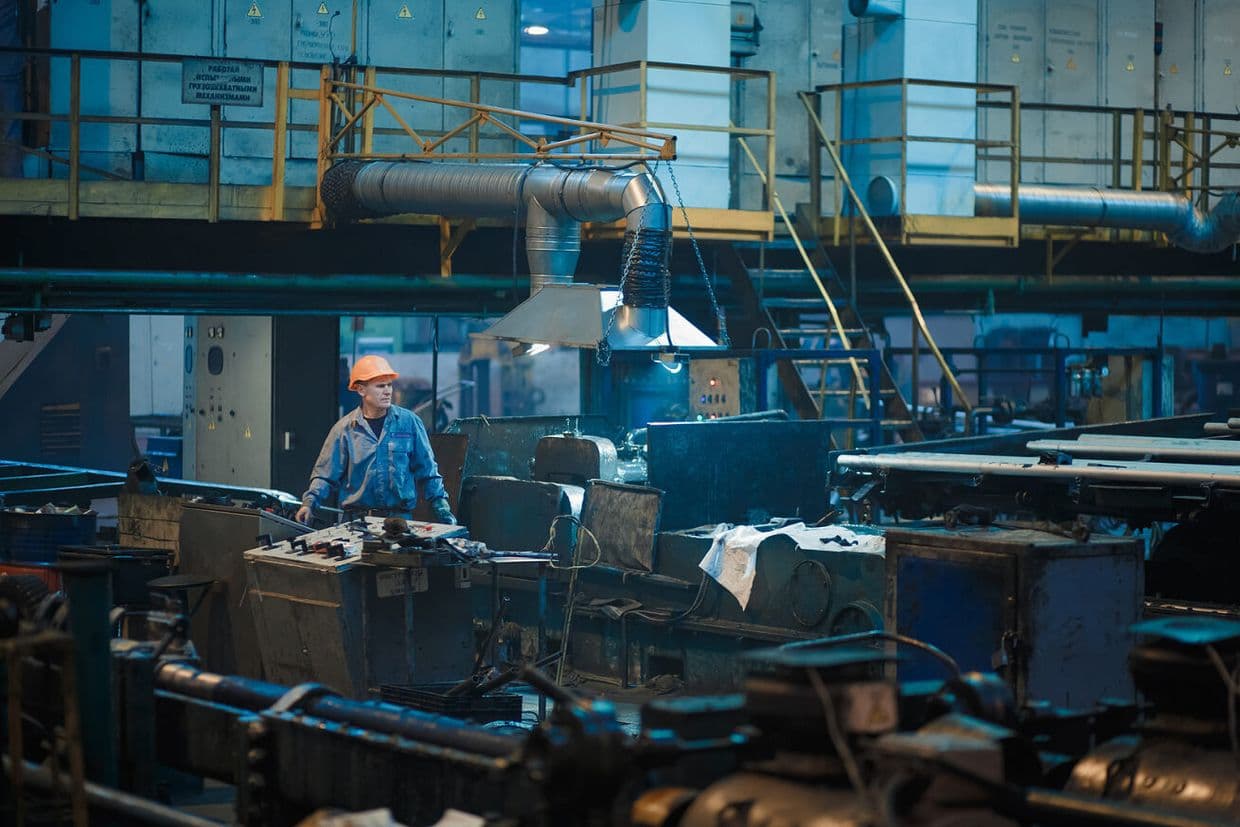Ukrainian companies are moving west. It’s changing the country’s economic map

When Russia intensified its shelling on Nikopol in Dnipropetrovsk Oblast in July 2022, Yuriy Atanasov knew he had to get his company out of harm’s way.
His steel pipe manufacturing company Centravis, located just 20 kilometers from Russian troops stationed across the Dnipro River at the occupied Zaporizhzhia nuclear power plant, was right in the crosshairs.
Concerned customers called Centravis worried that production would stop. “For some car models, we were the only supplier,” Atanasov told the Kyiv Independent.
The company produces a variety of pipes and tubes mainly for the automobile and energy sectors in Europe and around the world.
“Every fourth car in Europe has our tubes.”

With help from the government’s enterprise relocation program, Antasov moved 10% of Centravis’ production to Uzhhorod in western Ukraine. The new factory only produces the smaller steel tubes and parts needed for car engines.
From Oct. 2022 to Feb. 2023, Centravis transported equipment from Nikopol via 15 trucks to an old factory in Uzhhorod. The government provided Hr 500,000 ($13,300) for transport costs, but Centravis had to dig deep into its own pockets to cover the $1 million factory renovation.
Since the start of Russia’s full-scale invasion, thousands of businesses have been forced to relocate. The state program helped move 840 companies between March 2022 and Oct. 2023, peaking in the spring and summer of 2022.
Moving away from front-line regions and Russian-occupied territories has saved many companies from bankruptcy. It has also helped develop economies of host regions that have seen less development in the past, such as Ukraine’s western regions, and are eager to attract new business.
Businesses relocating from east to west also shift the economic balance of the country. Future investment could disproportionately favor one part of Ukraine and risk leaving the front-line regions in the east, heavily scarred by the invasion, lagging post-war.
“If we are talking about future investment flow to Ukraine after the war, I think it'll be concentrated in western Ukraine,” Serhii Fursa, the deputy managing director at investment firm Dragon Capital, told the Kyiv Independent.
Relocation has now largely slowed down compared to the initial months of the full-scale invasion. As enterprises settle into host regions, operations are also getting back to normal.
A preliminary report by the Kyiv National Economic University (KNEU) team found that 27.6% of relocated businesses have already recovered business activities to pre-war levels.
An estimated 43.1% are expected a full recovery within a year. Businesses have largely reported increases in customers, profitability, sales, and products.
Local authorities to the rescue
The Dnipropetrovsk administration connected Atanasov with local administrations in western Ukraine to help Centravis relocate. The company found the available factory space in Uzhhorod after an intensive two weeks of visiting sites in four regions.
After relocating, it began training locals who had little experience in metallurgy. Currently, Uzhhorod natives make up 70% of the workforce.
For host regions, attracting new industries and technologies is highly desirable and often competitive, according to Yevheniia Polishchuk, a professor at the KNEU. She told the Kyiv Independent that local administrations in western and central Ukraine are often fighting to attract companies.
Displaced businesses are effectively an investment in the host region, she notes. They contribute to economic development through employment, tax contributions, competition with local companies, and new technologies.
Local administrations have set up Entrepreneurship Support Centers to assist displaced businesses. The majority of enterprises told KNEU they are satisfied with the support from local governments who have also helped companies and their employees integrate into host regions.
Yuriy Tustanovskyi relocated his Sumy-based company Rekava, which produces cups and scented candles from recycled coffee grounds to his university city Lviv. In addition to support from the government’s relocation program, the Lviv regional administration provided a $3,500 grant.
It was not a life-changing amount of money. But Rekava was able to use the fund to partially cover a $15,000 machine.
Tustanovskyi had already lost a $250,000 investment at the start of the full-scale invasion when a Kyiv-based businessman pulled out due to the war. The team needed all the help they could get to start up again. He regularly communicates with the Lviv Oblast administration and continues to search for grants.
“If we had had to do everything by ourselves, it would have been more expensive and would have taken some additional months,” he told the Kyiv Independent.

Help from international organizations
International donors have also played an important role in supporting displaced enterprises.
Albina Kudryavtseva’s label printing factory Techno-Druk received 30,000 euros from the European Bank for Reconstruction and Development (EBRD) to cover relocation costs.
Kudryavtseva’s main challenge, however, was finding a courier during intense fighting at the start of the invasion. Her factory was located just seven kilometers from Russian troops on the outskirts of eastern Kharkiv. By the time her team had dismantled 20 metric tons of machinery in May 2022, the nearby town of Chuhuiv lay in ruins.
Through her network, Kudryavtseva managed to find a transport company that was willing to risk transporting her eight machines to Uzhhorod. The owner told her he needed the work, despite the danger.
“The price was very high. Maybe twice as much as normal,” Kudryavtseva told the Kyiv Independent.
A year after Techno-Druk resumed operations, the International Organization of Migration (IOM) also provided a grant for new equipment in July 2023.
Nevertheless, Kudryavtseva says that to start making money again the company needs more people. The costs of logistics, rent, and accommodation are piling up.
Incentives to return
Kudryavtseva, like many CEOs, cannot yet imagine returning to her hometown. Only 19% of businesses told KNEU that they plan to return.
Problems such as damaged infrastructure and mines persist. Around a third of the country is mined as a result of the war, according to Ukrainian officials. It could take decades to rid Ukraine of all of them.
Fursa predicts that investors and enterprises will be hesitant to do business close to the Russian border. He warns this could lead to depressive regions in the east.

But with stimulation investments, Polishchuk sees an opportunity to build new, modern, and innovative infrastructure in the east and south of the country. She stresses support programs will be needed to help businesses to return post-war.
“This is a very difficult task, but it's not a problem,” she said.
Half of the companies told KNEU that they would like to reopen an office in their native region as well as keep the office in their host region.
Others fear that moving back to their home region is but a pipe dream.
When explosions rang out across Mariupol on Feb. 24, 2022, Maria Bubnova’s worst fears had come true.
Many had already left the port city in Donetsk Oblast in the lead-up to Russia’s full-scale invasion. But Bubnova and her culinary business, Nova Kukhnya, made the mistake of staying.
She distributed tons of vegetables and 300 kilograms of soup that remained in her factory to volunteers and defenders in the city.
But on March 15, Bubnova said a final goodbye to the businesses that she had developed with her husband over ten years. Only a refrigerator was saved.

Bubnova and her husband rebuilt Nova Kukhnya from scratch in Slavutych, 150 kilometers north of Kyiv, without financial assistance from the government.
It pains her to think of how much equipment she lost. Fortunately, the company received $400,000 from international and local grants.
Six months after relocating, Bubnova is excited to announce Nova Kukhnya has just cooked the first batch of soup in their new facility. She and her family would love to reopen an office in Mariupol.
However, with the city nearly razed to the ground, she doesn’t see this happening for at least 15 years.
“The children need a safe environment and a safe psychological state. Mariupol does not allow for this yet.”














